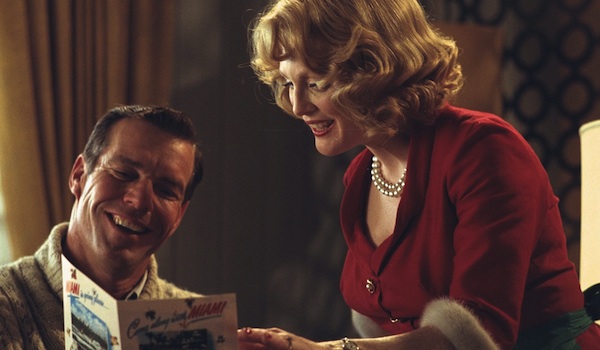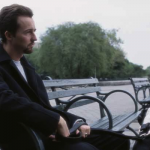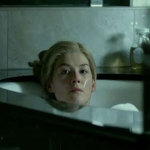Far from Heaven Review
Todd Haynes’ “Far From Heaven†transports us to a time that is often lampooned in film (1950s suburbia), but rarely taken seriously. It confronts some difficult social issues (racism, sexism, homophobia), while also finding time to develop some involving, non-manipulative melodrama. It’s also visually stunning and features one of the finest performances I’ve ever seen from Julianne Moore. This film has it all. It ropes you in immediately and doesn’t let you go until long after the credits roll.
It’s the 1950s in Connecticut, and Cathy Whitaker (Julianne Moore) has it all. She has two lovely children and a perfect home. Her husband is a successful television salesman, Mr. MagnaTech, and Cathy adores him. Her friends look up to her, and the town believes everything is as it should be in Cathy’s world.
But as we might expect from a movie in this time period, happiness is an illusion. Frank is a closeted homosexual. Cathy catches him cheating with another man. They try to deal with it, but Frank is stubborn and can’t change easily. He takes his frustration out on Cathy to the point of actually striking her. Cathy is barely able to stay composed, bottling up all of her emotions. But when she gets to know her genial African-American gardener, Raymond (Dennis Haysbert), she completely opens up to him. Soon enough, the two of them realize interracial relationships (even platonic ones) are as taboo as homosexuality, if not more so, and they are forced to deal with the consequences of people’s prejudices.
I’m not very familiar with Haynes’s body of work (the only other film of his I’ve seen is “I’m Not There†– which I thought was a noble mess), but “Far From Heaven†makes me think he’s a very capable director. The film is a nod to Douglas Sirk’s films, and it pays proper homage to Sirk’s melodramas while also making the material seem fresh. The themes are universal, but the time and place in which the film takes place (as well as the costumes, set designs, etc.) harken to a very unfamiliar time for me. Yet I found myself transfixed by the story and the characters. Haynes takes no shortcuts to get us to that point, letting the situations and emotions develop naturally.
Haynes’s work is equaled, if not surpassed, by the acting of the wonderful Julianne Moore. Moore has wowed me before – her performance in “Magnolia†for example – but she’s never been better than in “Far From Heaven.†We are immediately drawn to Cathy and her ability to be her own person in a time period which frowns upon anything outside the norm. Frank lets her down again and again, so she turns to Raymond for support, but nothing quite works out for her.
Moore has the uncanny ability to go for the jugular again and again. Every she has her heart broken, your heart breaks as well. But the emotions are never forced. Again, Moore and Haynes take their time developing our feelings for the characters.
Also offering up exceptional performances are Dennis Quaid and Dennis Haysbert. Quaid is volcanic as Frank. This is the actor’s best performance. He’s a monster (abusing his wife physically and emotionally), but you can’t help but feel sorry for him. All he wants is to be with a man, but he knows what will happen if he follows his heart. Haysbert plays a gentler variation of President Palmer from 24 (may he rest in peace). You can’t help but think Raymond has an answer for everything. He’s kind to a fault, very well-spoken, and immensely likeable.
I must make note of the incredible score by Elmer Bernstein. Few scores can invoke such strong emotions on their own, but whenever I hear it, I think of an impeccably dressed Cathy with her lovely lilac scarf going on a walk with Raymond, discussing life, and trying (but failing) to have a cordial relationship with someone of a different race. It makes me cry a little inside.
The film’s art direction, costumes, cinematography, etc. are all exceptional. There’s really not a single slip up throughout the proceedings. Oscar didn’t take serious notice of the film in 2002 (although Moore picked up an incredibly deserved nomination), but film fans, writers and scholars have all remembered it kindly – and deservedly so. It’s one of the most emotionally honest films I’ve ever seen.















